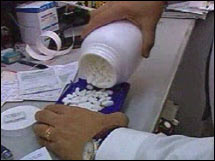 |
| Abbott drug fails to prevent fatal heart attacks in diabetics. |
|
| 'Me-too' drugs rake in sales
|
| Copycats like Lipitor can make billions, or fail like Vioxx and Bextra. (Full story)
|
|
|
|
|
|
DALLAS (CNN/Money) -
Tricor, a cholesterol drug from Abbott Laboratories, failed to reach its primary goal of preventing fatal heart attacks in a new field study unveiled Monday at the American Heart Association conference here.
Shares of Abbott Labs (down $1.72 to $42.01, Research) fell nearly 4 percent in midday NYSE trading.
Tricor, which totaled $779 million in 2004 sales, is marketed as a pill that lowers triglycerides and raises "good" cholesterol. The results of the new study showed that it could also be used to reduce milder forms of heart disease in diabetics with type 2, the most common type of diabetes.
The field study demonstrated the "mixed benefits" that Tricor reduced non-fatal heart attacks by 24 percent, but did not show any reduction in fatal heart attacks. Nearly two-thirds of diabetics die from a heart attack or stroke.
But patients taking Tricor, one of Abbott's best-selling medicines, fared better than those taking placebos on a number of secondary measures, including a reduction in the need for procedures to clear clogged arteries and for laser treatments of eye disease.
"This is the largest study of any intervention to prevent cardiovascular disease in diabetes today," said Dr. Anthony Keech, lead investigator in the study and professor of medicine at the University of Sydney. Keech said that type 2 diabetics have three or four-fold higher risk of heart attacks and strokes than non-diabetics.
If successfully marketed as a heart disease preventative as well as a cholesterol drug, the patient pool for Tricor could expand, as more than 90 percent of the 18.2 million diabetics have type 2.
Keech said that Tricor, also known as fenofibrate, could be used as an additive, not a replacement, to statins, the drugs used to control cholesterol levels, "because the results of the statin therapies are very clear as well." Keech said that patients with unhealthy cholesterol levels need all the help they can get to bring them under control.
The field study focused on 9,795 diabetic patients over a five-year period. Participants were aged 50 to 73 and were treated at medical centers in Australia, New Zealand and Finland.
The field study was funded by Tricor manufacturer Laboratoires Fournier SA in Dijon, France and an Australian organization, the National Health and Medical Research Council. Abbott has partnered with Fournier to market Tricor in the U.S.
Tricor does not involve insulin and does not regulate blood sugar levels.
Heart drug shows promise
A separate study involving a different Abbott drug, levosimendan, found that hospitalized heart failure patients taking the intravenous drug showed a greater chance of recovery than those receiving standard care, according to Dr. Milton Packer, lead investigator in the study.
The revive 2 study, funded by Abbott and Orion Pharma of Helsinki, Finland, focused on 600 heart failure patients, showed the risk of clinical improvement was 33 percent higher compared to standard care and the risk of clinical deterioration was nearly 30 percent lower.
Packer, professor and director of the Center for Biostatistics and Clinical Sciences at the University of Texas Southwestern Medical Center in Dallas, said there are one to three million hospitalizations per year for worsening heart failure and that he was "really excited" about the results of levosimendan.
Levosimendan, part of a class of drugs known as calcium sensitizers, helps the heart beat more forcefully and relaxes the blood vessels, making it easier to pump blood throughout the body. Levosimendan is currently not available in the United States but is marketed in 40 countries as Simdax.
Abbott, based in Abbott Park, Ill., near Chicago, reported total sales of $19.7 billion in 2004. The company's top-selling drug in 2004 was Biaxin, a $1.2 billion antibiotic.
-- Reuters contributed to this story
---------------
Heart disease hope for diabetics? Click here.

|